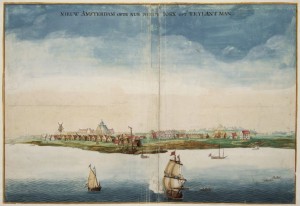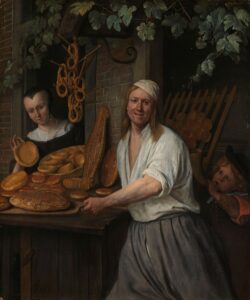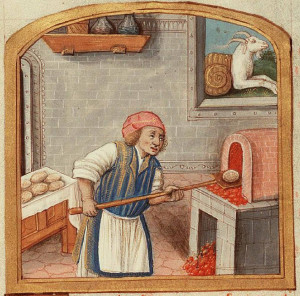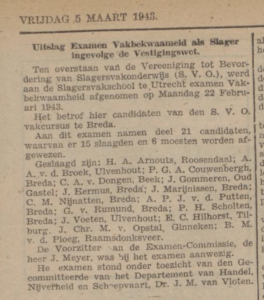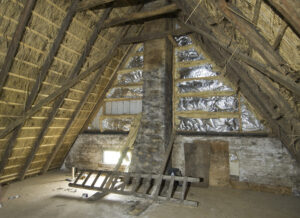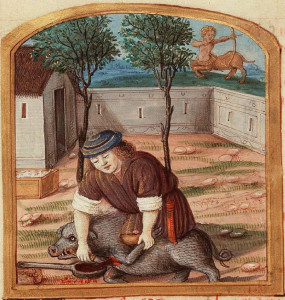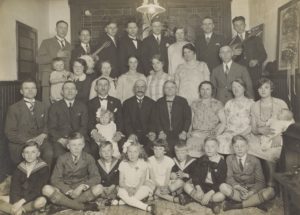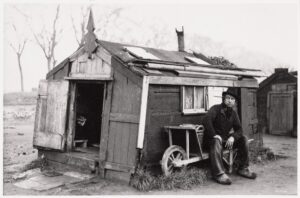Nieuw is the Dutch word for "new." You may come across the term in place names in Dutch colonies. For example, New York City was once called Nieuw Amsterdam in the colony of Nieuw Nederland (New Netherland). … [Read more...]
Dutch term – Duivekater
A duivekater was a traditional diamond-shaped bread eaten on religious holidays, mainly Christmas. It was often highly decorated. I have sometimes come across the term in deacons' accounts where poor children were given them as a gift. They can also be seen on various paintings from the 1600s. It is not a common word but a fun one to learn on Christmas day. … [Read more...]
Dutch term – Onbekend, Niet Bekend
Onbekend means "unknown." Niet bekend means "not known." You may encounter these terms when informants are asked for information they do not possess. For example, in death records, you may see a reference that the names of the parents are not known to the informants. Informants for death registers were often neighbors, who may not have known the deceased's parents. Other records may mention "vader onbekend" [father unknown] if the child is born out of wedlock. For tips on researching those … [Read more...]
Dutch term – Ab Intestato
Ab intestato means "without a will." The ab intestato heirs of a person are the people who would inherit by law if the person did not have a will. It is a Latin term you may find in Dutch documents regarding someone's estate, for example in a will or estate division. If a person writes a will, sometimes they may refer to the ab intestato heirs to indicate what (if anything) was left to them. It is just a shorthand for saying "to the people who would have inherited had I not made a will." If … [Read more...]
Dutch term – Xber or Xbris
In old records, you may find the word Xber or Xbris for the month. This means December or Decembris [Latin]. The names of the months were established when the start of the year was in March and December was the tenth month. Do not confuse Xber for October, the tenth month of our current calendar. … [Read more...]
Dutch term – Vakblad
A vakblad is a trade journal. Trade journals became popular in the early 1900s, though some go back further. Trade journals can have interesting information about your ancestors, such as: information about completed education or achieved diplomas membership of unions, committees, organizations publications by our ancestors information about their employers images of the trade they were in. You can find trade journals by searching the Tijdschriften [magazines] section at … [Read more...]
Dutch term – Zolder
A zolder is an attic. You may come across the term in estate inventories, that describe the items per room. People often used zolders for storage. In some cases, the zolder would be used to sleep. Attics were often poorly insulated, so this could be cold unless you slept next to the chimney. I heard a story of a Frisian family where the older boys had to sleep in the attic over a cow shed, which was very cold in winter. The house was not big enough for all the children so only the younger … [Read more...]
Dutch term – 9ber or 9bris
In old records, you may find the word 9ber or 9bris for the month. This means November or Novembris [Latin]. The names of the months were established when the start of the year was in March and November was the ninth month. Do not confuse 9ber for September, the ninth month of our current calendar. … [Read more...]
Dutch term – Oom
Oom means "uncle." Like in English, the Dutch word oom is used for the brother of a parent, or the husband of the sister of a parent. There is no separate word for paternal or maternal uncle. You may encounter references to ooms in guardianship records, estate inventories, as specification of how witnesses are related to the main parties, and in many other types of records. Records do not usually differentiate between full and half uncles, or between uncles-by-blood or uncles-by-marriage. … [Read more...]
Dutch term – Palingvisser
A palingvisser is a fishermen that specializes in catching eel. Several villages around the Zuidersee (South Sea, now a lake called IJsselmeer), like Volendam, were famous for their eels. … [Read more...]
